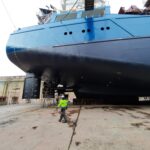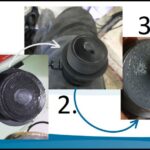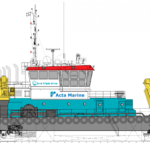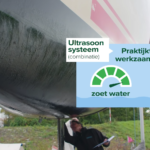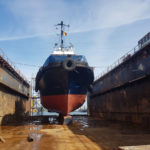According
to the leading Norwegian environmental group Bellona, the risks to both the
environment and the sustainability of commercial shipping from biofouling must not
be underestimated. The issue apparently poses a serious threat. However, Bellona
points out that through a proactive approach, a range of benefits can
be realized by progressive shipowners.
Biofouling occurs when aquatic organisms
accumulate on ship hulls. Their growth creates hydrodynamic frictional resistancethat leads to ship inefficiency. More fuel must be burnedto maintain operations, increasing both the shipowner’s operational expensesand air emissions. According to the IMO, thefuel consumption of the global fleet (and associated emissions) could even decrease by10% with better hull and propeller management. “Furthermore,” explainsSigurd Enge, head of shipping and the Arctic, Bellona,“biofouling is the main culprit in the spread ofinvasive marine species, which can devastate ecosystems and cause the extinctionof local species. This is exacerbated byclimate change. This allows larger newer species to be
introduced and enables invaders to survive at higher
latitudes, such as the Arctic, due to increased
water temperature. This creates a snowball effect that we must stop before
it is too late.”
There is an enormous need for change. While theIMO and global shipping address invasive species through regulationsregarding ballast water management, biofouling does not receive the sameattention, despite evidence that it is a much larger problem. A study from
New Zealand attributed more than 70% of invasive species to biofouling, and
only 3% originating from ballast water.
Sigurd
Enge says this is beginning to change, but not fast enough.
“New Zealand, Australia and California have launched their own requirements
and that is the beginning of a ‘trend’, with them leading ahead of the
rest of the industry,” he states. “However, collective action is
necessary to create one standard that everyone must comply with, and
that must come from the IMO soon. This is a regulatory gap that
must be closed. Our world needs this, and society, driven
by greater environmental awareness, will demand this.”
“But,” he adds, “shipowners should not view this
as a burden, but rather as an ‘enormous opportunity’. Effectively managing
biofouling is a win-win-win,” states Enge. “Clean hulls meanoptimized fuel efficiency and that significantly reduces operational costs.That in turn means fewer air emissions and abetter environmental profile. Then there is naturally no invasive species spread andthat is essential for the welfare of our marine ecosystems. It is
simply a ‘no-brainer’.”
However,
better hull cleaning solutions in the water are needed to effectively address the challenge.
Some current practices that should address the problem demonstrably worsen it. Enge says, for example, thatmanual diving teams and remotely operated machines that scrub hulls oftenrelease biofouling into the water, effectively facilitating invasive species spread.The process can also damage a vessel’s antifouling coating,allowing potentially toxic biocides to enter the water.Therefore, cleaning with ‘capture’ or offshore certainly receivespreference, he believes, but for the optimal solution the industry mustbe ‘proactive’. “The best approach is absolutely a proactivecleaning solution,” he says. “If organisms stopgrowing in the first place, you prevent the problem, it’s that simple. That means
that neither the shipowner nor the environment ever has to pay the price for
transporting biofouling. At Bellona we would like to see more of this
– solutions that act as protectors for both ships and nature and
help this industry move more sustainably into the future.”
Bellona
is an independent non-profit organization dedicated to addressing
climate challenges and helping to facilitate sustainable
environmental solutions. The foundation was established in 1986 and has its headquartersin Oslo with international offices in Brussels, St. Petersburg and Murmansk,Russia. The Bellona Foundation is an independent non-profitorganization that strives to address and combat climate challengesby identifying and implementing sustainable environmental solutions.They strive for greater ecological understanding, protection ofnature, the environment and health. Bellona engages with a broad
range of current national and international environmental issues and problems throughout
the world. The Bellona Foundation was established in 1986. They currently work
with 57 employees at the headquarters in Oslo and their three international
offices in Brussels (Belgium / EU) Murmansk (Russia) and St. Petersburg(Russia). They have websites in Norwegian, English and Russian. The field
is broad and the staff consists of individuals with extensive
professional backgrounds. With more than 30 years of experience, they have built a uniquenetwork, both nationally and internationally. The work has
received international attention within various disciplines and
Bellona’s advisors are often sources and experts in the field of
climate change, both in national and international press.






